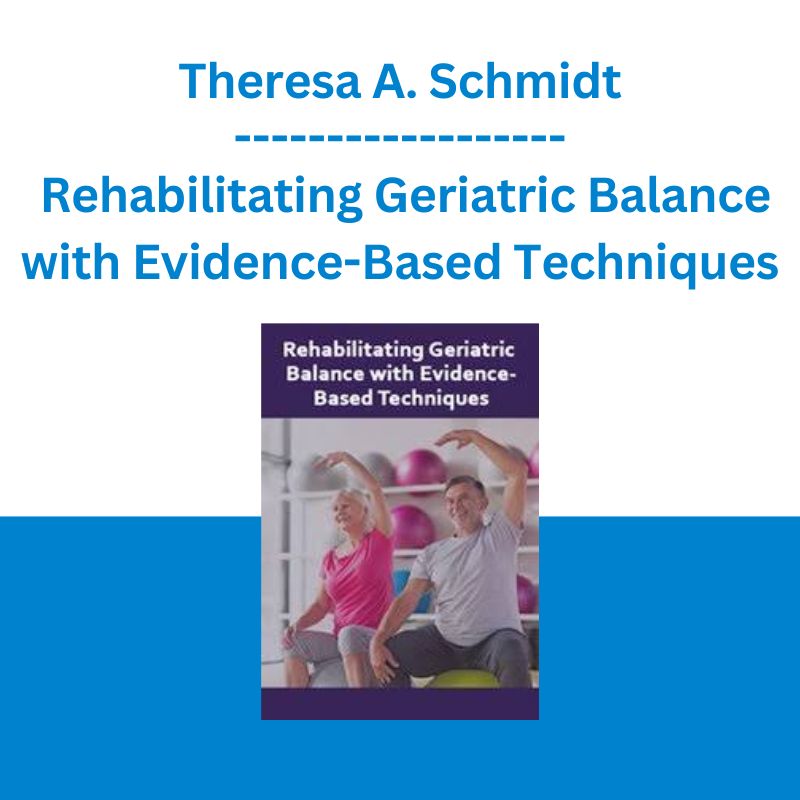*** Proof of Product ***
Exploring the Essential Features of “Theresa A. Schmidt – Rehabilitating Geriatric Balance with Evidence-Based Techniques”
Falls are the leading cause of injury death and the most common cause of nonfatal injuries and hospital admissions for trauma among older adults. Although prevalent, providers often discover balance deterioration in its aftermath, learning to recognize and treat balance disorders from piecemeal lessons learned the hard way. The rapidly expanding healthcare needs of America’s booming geriatric population, combined with strict reporting requirements for Medicare reimbursement effected in 2013, demand that healthcare professionals learn to assess functional measures correctly and, more importantly, prevent falls before they happen.
Learn evidence-based balance examination and rehabilitation techniques with hands-on practice in this comprehensive recording. Explore the epidemiology of falls and review current evidence that indicates the effectiveness of the interventions presented, with recommendations for designing programs to achieve functional outcomes for balance rehabilitation. Finally, review basic G-codes to use for maximum reimbursement as you expand your practice with an aging population that relies heavily on Medicare. Step confidently from this recording with balance assessment and rehabilitation strategies that can be put into practice immediately for measurable objective results while protecting your bottom line.
Speaker
Dr. Theresa Schmidt is an orthopedic physical therapy specialist and massage therapist integrating traditional and alternative medicine with emphasis on manual therapy, precision exercise, wellness, Reiki, hypnosis, and mindfulness. She presented for NASA/Inomedic, Johns Hopkins, Cleveland Clinic, Vanderbilt Med, Wake Med, and professional associations. She received her doctorate at UNE and served as faculty at Touro PT Programs and CUNY Queens Colleges in NY. She is a published author, Expert Consultant, Reiki Master Instructor, and hypnotherapist in private practice at Educise® in New Hampshire.
Speaker Disclosures:
Financial: Theresa Schmidt has employment relationships with Educise and Home CEU Connection.com. She receives a speaking honorarium and a consulting fee from PESI, Inc. She has no relevant financial relationships with ineligible organizations.
Non-financial: Theresa Schmidt is a member of APTA and AMTA. She has no relevant non-financial relationships.
Outline
Neuromuscular and Medical Challenges of Aging
- Medications
- Medical conditions
- Degenerative processes
Examination: Screening for Balance
Balance Tests
- Vertebral Artery
- Timed Up and Go (TUG)
- Unilateral Stance
- 5 Times Sit to Stand (5TSS)
- Step Test
- Functional Reach
- Berg Balance Scale Lab
- Falls Efficacy Scale
- Falls Risk Self-assessment
- Activities-specific Balance Confidence scale
- Besttest
- MiniBestest
- Brief Bestest Lab
Gait Tests
- Timed Up and Go
- 6 Minute Walk Test
- Figure 8
- Modified Gate Efficacy Scale
- Tinetti Performance Oriented Mobility Assessment
- Gait Abnormality Rating Scale
- Dynamic Gait Index Lab
- Star and Y Balance Tests
- Other balance tests
Interventions to Promote Balance and Prevent Falls
Balance Rehab
- Fall reduction education
- Therapeutic neuromuscular and functional exercise
- Otago
- LIFE
- Tai Chi
- Wii
- Other balance programs
Active Balance Clinic (ABC) Program
Evidence-Based Outcomes, Reliability, and Validity Studies on
Balance Tools and Interventions
Effect of Interventions on Fall Reduction, Rates, and Risk
Documentation Recommendations, G-codes
American Geriatric Society Panel Recommendations
Target Audience
- Physical Therapists
- Physical Therapist Assistants
- Occupational Therapists
- Occupational Therapy Assistants
- Nursing Home Administrators
- Rehabilitation Managers
- Assisted Living Staff
- Long-Term Care Staff
- Nurse Managers
Nurses
Objectives
- Describe the physiological components of balance and the effect of aging on stability
- Produce examples of balance strategies used to correct deviation of the center of gravity from the base of support and how these strategies are altered by aging
- Perform current, evidence-based balance tests to determine fall risk
- Discuss current evidence for exercise and functional activity interventions to reduce the risk of falls
- Outline G-codes to use in conjunction with balance rehabilitation
- Review the research on balance examinations and interventions for reducing falls
Please see the full list of alternative group-buy courses available here: https://lunacourse.com/shop/










 Sovereign Man Confidential - Renunciation Video
Sovereign Man Confidential - Renunciation Video  Atlas API Training - API 570 Exam Prep Training Course
Atlas API Training - API 570 Exam Prep Training Course